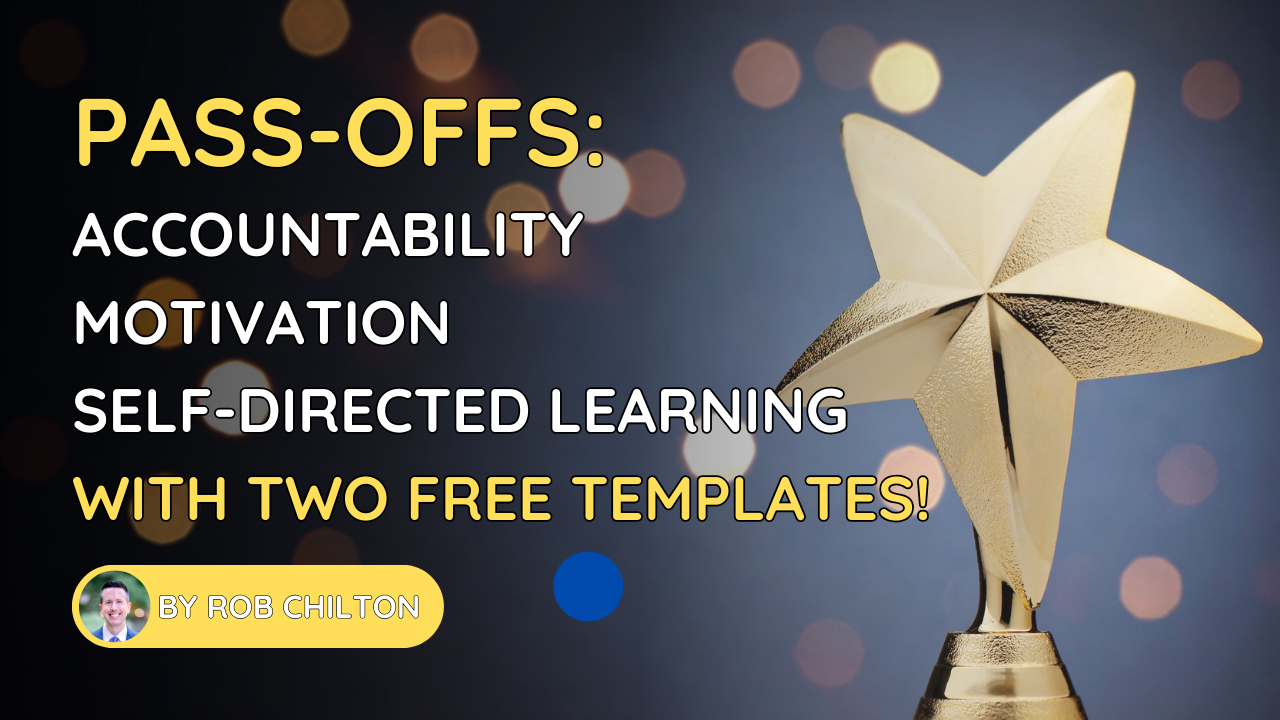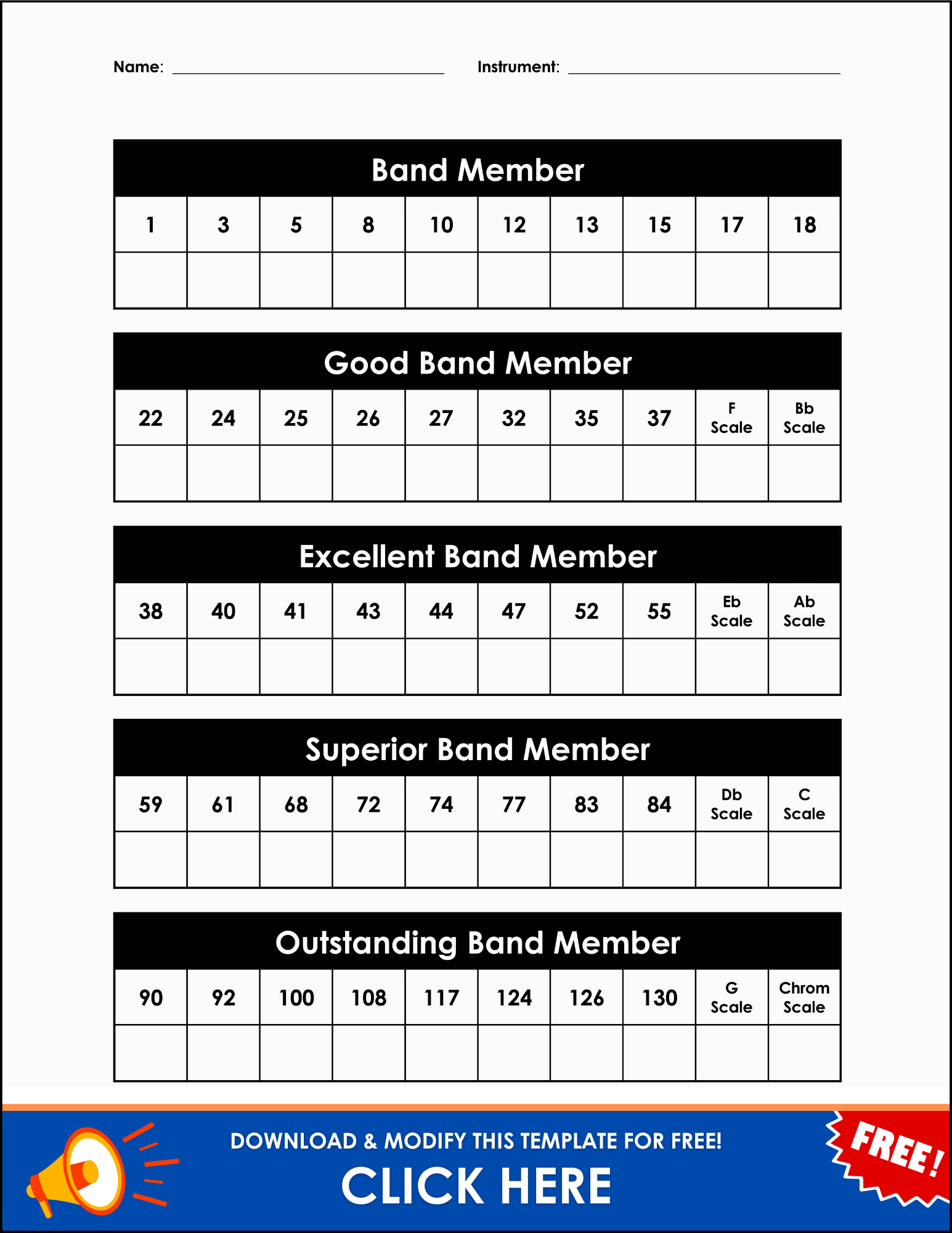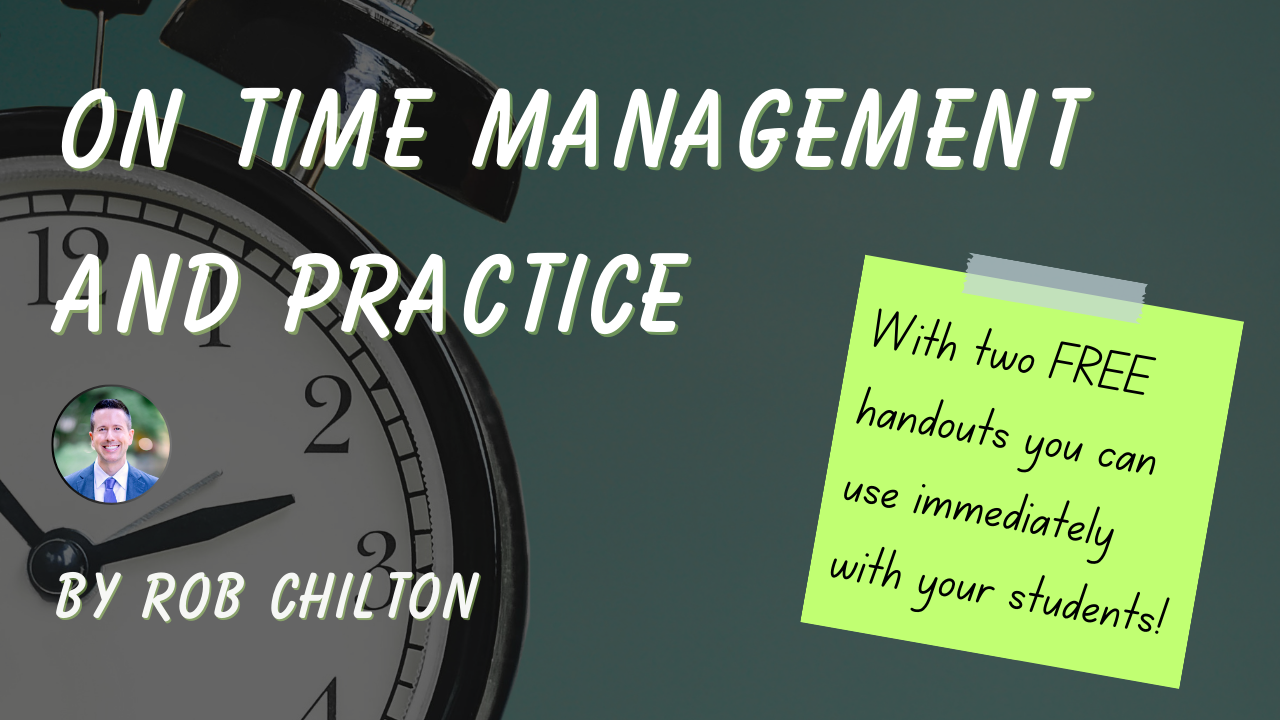Pass-offs: Accountability, Motivation, & Self-Directed Learning (Part 2)
Oct 01, 2025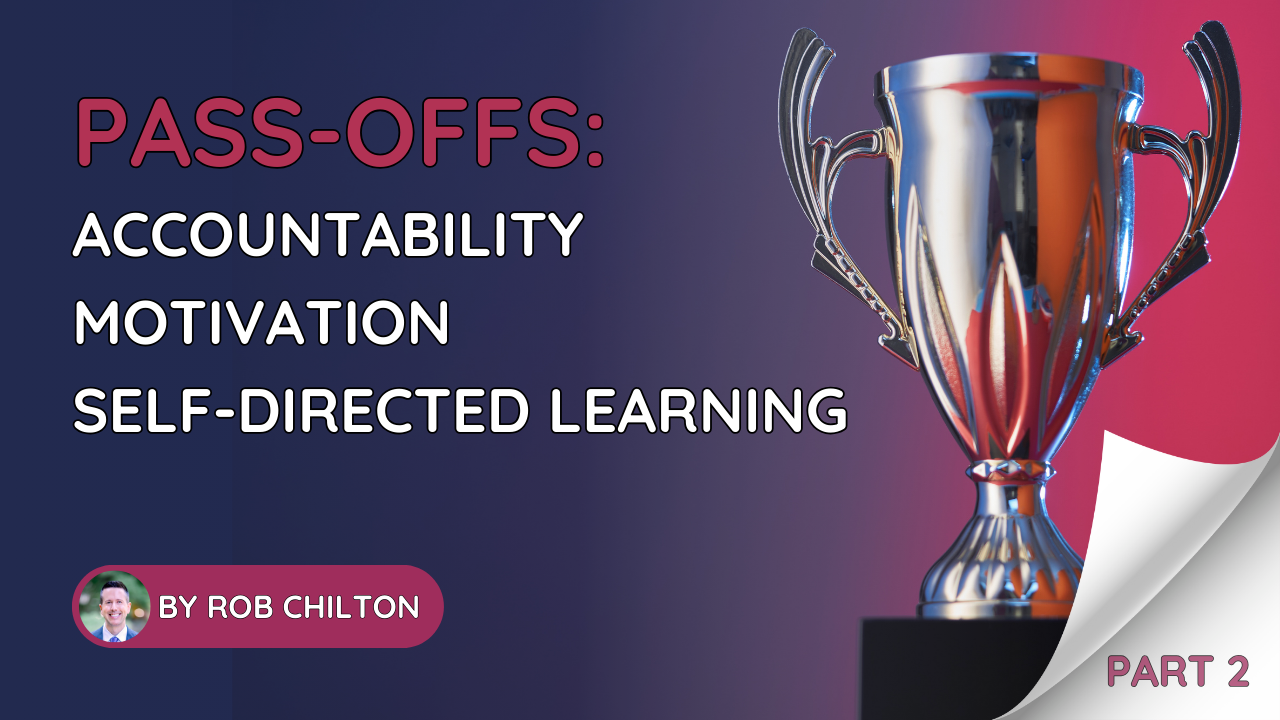
Estimated Read Time: 5 minutes
By Rob Chilton
In July 2024, I wrote an article about creating accountability, motivation, and self-directed learning with a pass-off system—which I’ve linked below. Since then, I’ve received considerable interest in the topic, so I thought now would be a good time to dive deeper.
The Pass-off Sheet
As mentioned in my first article, around the sixth week of school every beginner was given a pass-off sheet like the template below:
Explaining Pass-offs
After handing out the pass-off sheet, my basic script explaining the system was the following:
To get started:
- Notice that there are five sections: Band Member, Good Band Member, Excellent Band Member, Superior Band Member, and Outstanding Band Member.
- Each section has 10 pass-offs. Every number is a line from your method book, and every scale is a scale from your scale book.
- How it works: Start at the first box—it’s line 1 from your method book. Perform that line first, and if you play it correctly, a director will pass it off by writing their initials in the blank box below it. Then, you can progress to line 3, and so on. Once you complete a section, you’ll earn a ribbon on your locker like this:
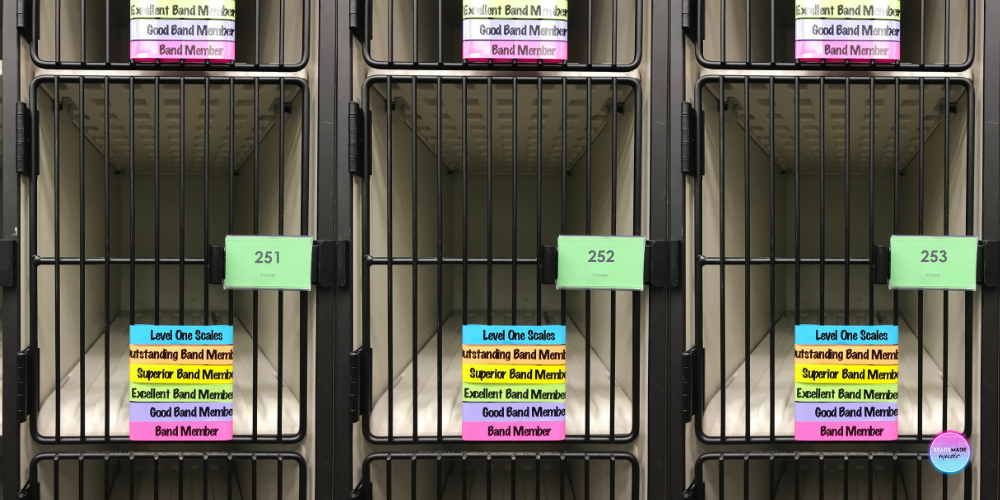
Additionally:
- You must go in order—and no skipping lines. If you get stuck, use your imaginary musician’s toolbox. Check your fingering chart if you’re unsure of a note, or clap and count to work through a tricky rhythm. Still having trouble? Break the passage into smaller chunks, or ask a friend, student aide, private lesson teacher, or director for help.
- Only a director can pass lines. A friend, student aide, or private lesson teacher may help you prepare, but the final pass must come from a director.
- Lines must be performed individually—no group pass-offs. Learning to play solo is an essential part of becoming a musician, and these pass-offs will help you build confidence in performing for others.
- Lines must be performed with a metronome and with tone and technique appropriate for our current stage of development. As the year goes on, we’ll expect a higher level of performance—just as a math teacher expects stronger work on the last day of school than on the first. In the same way, our expectations will increase as time progresses.
- We may sometimes pass a line even if there’s a small mistake. Mistakes are part of the learning process—no one plays everything perfectly 100% of the time. We’re more likely to allow mistakes that are random performance errors, especially if the recovery is strong, rather than errors that come from a lack of preparation.
- The director has the final say on whether a performance passes. We do our best to keep the standard consistent and fair, but you may not always agree with every decision. If you’re disappointed or frustrated, ask for feedback or guidance. Our goal is always to help you progress, never to hold you back.
- You may attempt a pass-off as many times as needed—but not in the same sitting. If you try today and don’t pass, we’ll usually ask you to practice at home and try again another day. Our class time is shared and limited—we’re often unable to provide multiple retries in a single period.
- Pass-offs are part of our regular in-class routine, with additional opportunities before and after school. In class, most pass-offs happen on Fridays after we’ve learned the week’s new material. Outside of class, they’re usually offered Thursday mornings and Friday afternoons. We’ll share more details about how to sign up later.
- You’re welcome to work ahead and pass off lines beyond where we are in class. Between your pass-off sheet, method book, scale book, fingering chart, and growing library of literacy worksheets, you have all the tools you need to work ahead—and we encourage it!
Check out our music literacy method!
Make Practicing Pass-offs Easier—Highlight the Lines
After explaining how pass-offs work, we hand out highlighters and mark the line numbers for each pass-off in the method book.
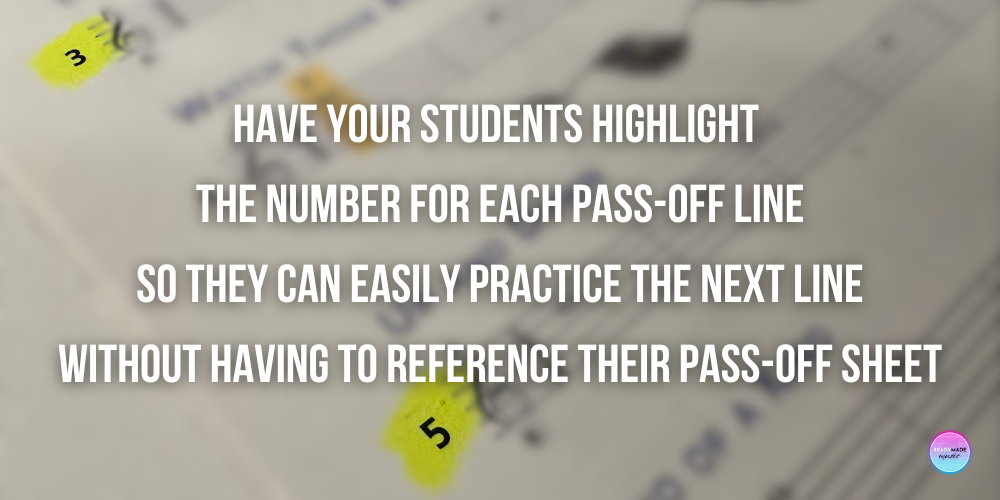
This way, when students practice at home, they don’t have to pull out their pass-off sheet to know what comes next. I found early on that highlighting made them more likely to practice ahead—it’s simply more convenient. With the book already open and the next line clearly marked, many will just give the next line a try!
Tip: For the scale pass-offs, we had them write the scale name in their method book below the line it came after. This way, they would remember to go back to their scale book and practice it.
Waiting to Implement
Timing is key when implementing pass-offs. After explaining the system, wait a few weeks before hearing individuals. For example, if I distributed the pass-off sheet in week six, I’d hold off until week nine—or until we reached line 15 in the method book—before starting pass-offs. This way, every student had a legitimate chance of success on that first day of pass-offs.
By the way: Waiting until the ninth week of school helped my students push through what I call the “Ninth Week Roadblock”—something I discussed in my last post:
The First Days of Pass-offs
After building anticipation for a few weeks, we would usually set aside two days—usually a Thursday and Friday—to kickstart the pass-off system. On the first day, we start with line 1. Everyone plays it, then everyone tries to pass it off. Then, we progress to line 3. Everyone plays it, and those students now on line 3 attempt to pass it off. Then, we continue progressing forward until we run out of time—or until there are no more achievable pass-offs for the day. On the second day, we repeat the process from line 1. This two day kickstart would usually result in everyone passing off at least one line and sending them home for the weekend excited to practice for the next opportunity.
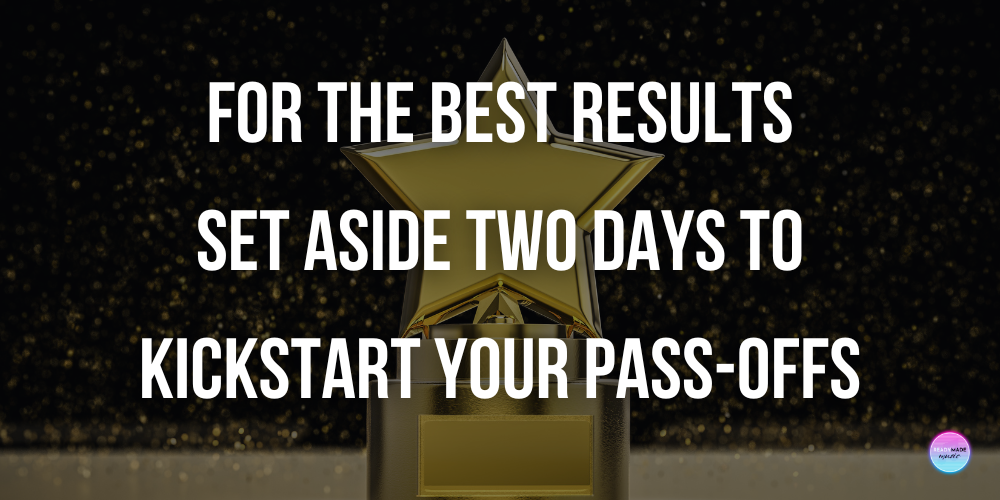
Differentiated Pacing & Self-Directed Learning
As teachers, we’re often stuck teaching to the middle—delivering instruction aimed at a group’s average ability level. The difficulty with this approach is that it leaves struggling students behind and advanced students unchallenged. What I love about the pass-off system is that it provides a destination, puts students in the driver’s seat, and lets them control their pacing. Without it, those who fall behind often give up, while those eager to move ahead don’t know where to go next—and neither group comes close to reaching their potential.
Stay tuned! I’ll be sharing more on topics like:
- Tracking student performance
- Managing the spread of achievement levels
- How much feedback to give
- Setting, maintaining, and balancing standards
- Connecting pass-offs to grades
- Different in-class approaches (down-the-row, take it from the top, catch-up, and more)
- What to do when students complete the entire sheet
- …and much more!
Suggested Reading:
Never miss a new posting!
Check out this short video!
About the author:

Rob Chilton is the creator and owner of Readymade Music, LLC and its content. Previously, Chilton was a middle school band director from 2007-2021. His most recent teaching position was the Head Band Director at Killian Middle School in Lewisville, Texas from 2014-2021.
Under his direction, the Killian Honors Band was named the 2018 Texas Music Educators Association CC Honor Band and performed at the annual 2018 TMEA Clinic/Convention. In 2019, the Killian Honors Band was invited to and performed at The Midwest Clinic in Chicago. Additionally, the Killian Honors Band was named a National Winner in the Mark of Excellence National Wind Band Honors Project in 2015, 2016, 2017, 2018, and 2019.
Chilton is a graduate of Southern Methodist University where he had the opportunity to study music education under the tutelage of Lynne Jackson and Brian Merrill. During his years as a middle school band director, Chilton continued his professional growth under the guidance of his primary clinicians, John Benzer and Brian Merrill.
Chilton’s mission for Readymade Music is to promote the overall well-being of music education and support school music teachers by providing solutions to help make teaching music more efficient and inspirational while increasing engagement for 21st century learners.

© 2025 Readymade Music, LLC
All rights reserved.
The unauthorized distribution and/or reproduction of this work is illegal.

